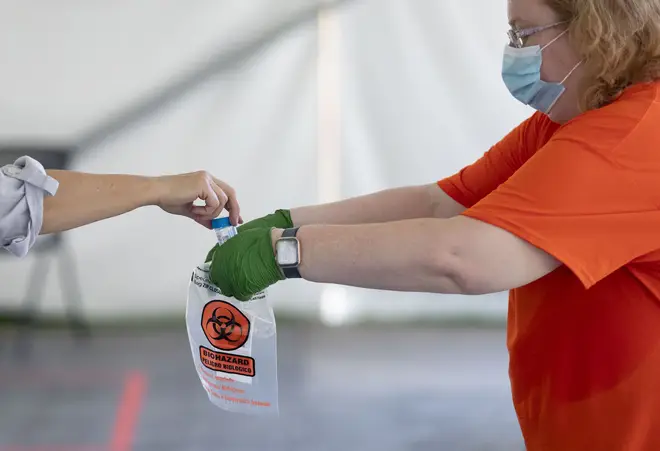
Richard Spurr 1am - 4am
10 September 2020, 19:22 | Updated: 11 September 2020, 07:36

Students at the universities of Exeter and Cardiff will be given new saliva Covid-19 tests this autumn, as planning continues inside the Government and higher education sector for a “mass movement” of students returning to campuses.
The universities’ plans to use the new tests, created in UK labs, come as Boris Johnson launched a multi-billion “Operation Moonshot” effort on Wednesday, which would see regular saliva tests used to allow the country to live normally alongside coronavirus.
There are significant concerns that students returning to campuses across the UK in the coming weeks could spread the virus, as rising cases in the UK are concentrated predominantly amongst young people.
Read more: Weekly coronavirus cases at their highest since launch of Test and Trace
Exeter University have announced a partnership with Halo, one of the UK’s first providers of saliva-based Covid tests, offering students “a rapid testing service without having to leave their accommodation”.
Those who provide spit samples in the morning will have their results by the afternoon, issued through an encrypted app.

Government considers spending £100bn on mass testing programme
Halo guarantees a return on all test results within 24 hours of the sample being given, but say the lab test itself only takes four and a half hours, whilst their normal turnaround times are “much, much shorter than 24 hours”.
An Exeter University spokesperson told LBC initially the system would be focused on students with symptoms, but they “may target students returning from cities with high cases or international students from high risk countries”.
The university is “not currently planning mass screening or testing”, they explained, but will be using “an intelligent evidence-based approach” to target those most at risk.
Government guidance released in the early hours of Thursday said operating a university led testing programme is a “voluntary decision” and they “do not expect this to be a service offered by all higher education providers.”
Universities will still have to “follow guidance on working safely during the COVID-19 outbreak”, the Department for Education said.
Cardiff University have also announced they will be offering students saliva tests when they return to university, but will also include asymptomatic students.

"We're blinded by the people we're not testing"
However, unlike Exeter, where students will be able to send off spit samples from their rooms, Cardiff are asking their students to visit a testing station.
Meanwhile, Cambridge University has gone further and announced they will test around 15,000 students weekly.
These will be traditional nose and throat swab tests, which will be processed at the national testing facility on Cambridge’s Biomedical Campus, raising concerns that testing asymptomatic university students could reduce the capacity to test others with symptoms.
Exeter University’s spokesperson said their commercial partnership with Halo has been agreed to “help the NHS, so the university is not drawing on the resources of the local area”.
Joe Windo, Scientific Director at Halo, told LBC they use different kits to government tests, saying: “We're not essentially depriving them of any reagents.”
Mr Windo claims the company’s tests are easy to do without supervision and “don't need a complicated system where someone rams a swab right into the back of your throat”.

Coronavirus universities: 'No doubt' blended learning will be bad for businesses
“A mass testing approach is a logical way of dealing with a problem like coronavirus. We think that the best way to control the spread of the virus is to know who is spreading it”, he said.
There have been concerns that mass testing may lead to hundreds of thousands of people being unnecessarily labelled as having coronavirus.
Professor Sir David Spiegelhalter, a statistician at the University of Cambridge, said: “the huge danger is false positives - no tests are perfect, it is not a simple yes/no thing.
“If you only have 1% false positives among all the people who are not infectious, and you're testing the whole country, that's 600,000 people unnecessarily labelled as positives.”
But Mr Windo claims their new saliva test, which targets a different gene in the coronavirus to the current NHS tests, will overcome the problem of false positives.
Their analysis of the tests found “no targeting of any other known virus”, including “coronavirus outside of Sars-Cov-2, Rhinovirus and influenza”.
Listen & subscribe: Global Player | Apple Podcasts | Google Podcasts | Spotify
“Our specificity really is cutting edge - world class. I don't think we have got any reason to be concerned about false positives on that front at all,” Mr Windo told LBC, claiming it is “absolutely” more accurate than the current NHS test.
Saliva tests from other British start-ups are also becoming more widespread. iAbra are offering a 20 second test, which has been trialled for the last three weeks at Heathrow Airport.
Heathrow’s chief executive, John Holland Kaye, has thrown his support behind iAbra saying: “It is quicker and cheaper and potentially more accurate [than the PCR tests]. We urge the Government to fast track this technology to protect the economy and help save millions of jobs in this country.”
However, while iAbra’s saliva test is significantly faster, it does not use the current gold standard polymerase chain reaction test, like Halo and the NHS.
CEO of Halo, Jonathan Biles, told LBC the company has been in discussions with the NHS and “will scale up to fit the demand”.
"We are in touch with a lot of organisations, both commercial, educational, financial,” he disclosed, but said if the government “are going to try and do this for Christmas Day and start at the beginning of December then they are going to have trouble."